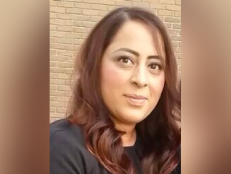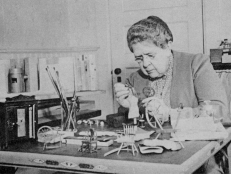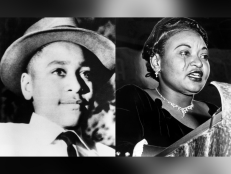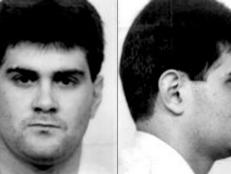5 Things You May Not Know About The Rise And Fall Of Aaron Hernandez
Aaron Hernandez: An ID Murder Mystery, premieres Monday, January 20 at 9/8c on ID.
Aaron Hernandez [Boston Globe/Getty]
Aaron Michael Hernandez rocketed to fame as a tight end for the New England Patriots. His fall from grace was just as swift and dramatic. In 2013, roughly a year after he signed a $40 million, five-year contract, he was arrested for murder and cut from the Massachusetts team. While additional murder charges, criminal allegations and suspicion followed the fallen football player, his troubling life story ended with one last tragic twist.
He Murdered His Future Brother-In-Law
Aaron Hernandez in court August 22, 2013 [Photo by Jared Wickerham /Getty]
Authorities arrested Hernandez in 2013 for the slaying of semi-professional Boston Bandits football player Odin Lloyd. At the time of his death, Lloyd, 27, was dating Shaneah Jenkins, the sister of Hernandez’s fiancée, Shayanna Jenkins.
According to prosecutors, Lloyd was seen with Hernandez and two of Hernandez’s friends in the early morning hours of June 17, 2013. A jogger discovered Lloyd’s body later that same day. He had been shot to death, CNN reported.
“You had these two sisters who were so close before Odin Lloyd’s murder now separated — and separated in the courtroom, sitting on either side, not looking at each other,” WXFT Boston reporter Ted Daniel said on the new Investigation Discovery special "Aaron Hernandez: An ID Murder Mystery." Daniel added, “It was just absolutely compelling.”
In 2015, Hernandez was found guilty of murder and received a sentence of life in prison without the possibility of parole.
Lloyd’s Murder Led Police To Investigate Other Unsolved Murders
Safiro Furtado's and Daniel de Abreu's graves [Boston Globe/Getty]
While looking into Lloyd’s death, police claim they found evidence Hernandez was involved in two South Boston murders. In May 2014, authorities filed multiple charges against Hernandez in the July 2012 double slaying of Cape Verdean immigrants Daniel de Abreu and Safiro Furtado. The charges included two counts of first-degree murder and three counts of armed assault with attempt to murder.
Alexander Bradley, who told police he was with Hernandez the night of the killings, testified at trial that de Abreu bumped into Hernandez at a club, spilling his drink. Later that evening, Bradley was driving with Hernandez when they pulled up to de Abreu and Furtado’s vehicle at a stoplight. Bradley alleged Hernandez opened fire on the men, killing them both.
On April 14, 2017, a jury acquitted Hernandez of the murder charges. He was found guilty, however, of unlawful possession of a gun and received four to five years to serve concurrently to his life sentence.
The Boston Globe reported prosecutors declined to prosecute Bradley after Hernandez’s not guilty verdict. ‘‘Our theory of the case stands,’’ Suffolk District Attorney Daniel Conley said. ‘‘In our minds, [the evidence] points inescapably to Aaron Hernandez.”
Hernandez Won A Second Court Battle Related To The Double Homicide
Alexander Bradley in court [Boston Globe/Getty]
After the double-murder trial, prosecutors charged Hernandez with witness intimidation, claiming he shot Bradley in the face to prevent him from testifying against him. Bradley lost his right eye in the alleged incident. Hernandez was ultimately acquitted of the charge.
Prosecutors Claim Hernandez Memorialized Murder
Close up of Aaron Hernandez's hands [Boston Globe/Getty]
During Hernandez’s trial, prosecutors contended the football player memorialized in ink the double murder of de Abreu and Furtado, according to The Boston Globe. Tattoo artist David Nelson testified Hernandez asked him to design a six-cylinder revolver barrel with only five rounds — the number of shots fired at de Abreau and Furtado’s vehicle, authorities said.
Researchers Discovered Hernandez Had Severe Brain Damage
Photo: Dr. Ann McKee announces her findings on her examination of the brain of Aaron Hernandez during a press conference at Boston University on Nov. 9, 2017. [Boston Globe/Getty]
Corrections officials found Hernandez hanging in his cell at the Souza-Baranowski Correctional Center in Lancaster, Massachusetts, at 3:05 a.m. on April 19, 2017. The 27-year-old was pronounced dead roughly an hour later.
Researchers at Boston University CTE Center examined Hernandez's brain after his death and reportedly discovered he had chronic traumatic encephalopathy, a neurodegenerative brain disease also known as CTE.
"Not only were the results positive, but we're told that it was the most severe case they had ever seen for someone of Aaron's age,” Hernandez’s attorney, Jose Baez, told CNN.
The news station reported the condition, which is often attributed to repeated head trauma, could lead to confusion, aggression, rage and suicidal behavior.
Aaron Hernandez: An ID Murder Mystery, now on ID GO!
Aaron Hernandez [Boston Globe/Getty]
For more on the life and death of the late New England Patriots football player, watch the limited series Aaron Hernandez: An ID Murder Mystery, on ID GO!















